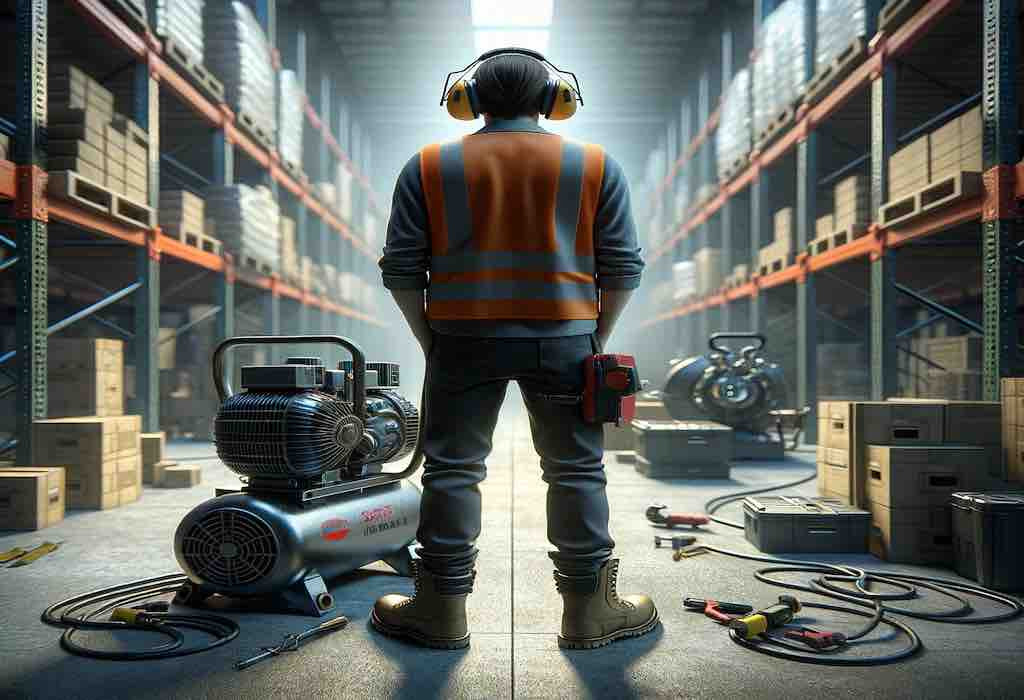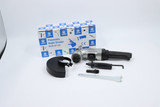Air Compressor Noise Reduction Techniques
Air compressors are invaluable in various industrial, commercial, and residential settings, powering everything from pneumatic equipment to HVAC systems. However, their noise can be a significant concern, leading to discomfort and potential hearing damage if not properly managed. This comprehensive guide explores various techniques and solutions for effectively reducing air compressor noise levels enhancing workplace safety and comfort.
Key Takeaway
Investing in noise reduction techniques for air compressors is a wise decision for any business. It enhances workplace safety, complies with noise regulation standards, and improves worker satisfaction and productivity.
Understanding Air Compressor Noise
Air compressors can be pretty noisy, with some models reaching up to 90 decibels (dB) or more during operation. This noise is produced by the rapid movement of air and mechanical parts within the compressor, including the motor and pistons. The noise level depends on several factors, such as the type of compressor, its size, and how it is maintained.
Key Factors Influencing Noise Levels:
- Type of Air Compressor: Piston compressors tend to be noisier than screw compressors due to their operation mechanics.
- Maintenance Level: Poorly maintained compressors can develop issues like worn belts and loose components, which increase noise output.
- Operating Environment: The surrounding environment can amplify noise, especially in enclosed spaces with hard surfaces.
Effective Noise Reduction Strategies
Reducing air compressor noise involves a combination of proper equipment selection, installation adjustments, and ongoing maintenance. Here are several effective strategies:
1. Choose a Quiet Air Compressor
Opt for models designed with noise reduction in mind when purchasing a new air compressor. Many manufacturers now offer "silent" or "quiet" air compressors that incorporate sound-dampening technologies such as:
- Low-Noise Motors: These motors are specifically engineered to produce less noise.
- Soundproofing Materials: Built-in soundproofing materials absorb and minimize noise emissions.
- Vibration Dampeners: These reduce the vibration of the compressor, which is a significant noise source.
2. Use Sound Enclosures
Placing your air compressor inside a soundproof enclosure can dramatically reduce noise levels. These enclosures are designed to absorb sound waves before spreading into the surrounding environment. Options include:
- Custom-Built Boxes: Construct a box using sound-absorbing materials such as acoustic foam or mass-loaded vinyl.
- Commercial Enclosures: Pre-made sound enclosures are available and can be a more convenient and effective solution, though they may be more costly.
3. Implement Anti-Vibration Mounts
Vibrations contribute to noise and can also lead to wear and tear on the compressor's components. Installing anti-vibration mounts or pads under the compressor can reduce the noise generated by vibrations. These mounts absorb the vibrations before transferring to the floor and the surrounding structures.
4. Regular Maintenance
Maintaining your air compressor is crucial in minimizing noise:
- Tighten Loose Parts: Regularly check and tighten any loose screws, belts, or fittings that can rattle and produce additional noise.
- Lubricate Moving Parts: Proper lubrication reduces friction in moving parts, decreasing operational noise.
- Replace Worn Components: Worn or damaged parts, such as valves and seals, can increase compressor noise and should be replaced promptly.
Advanced Noise Control Techniques for Air Compressors
Continuing from essential maintenance and setup modifications, there are advanced strategies that can further reduce noise levels of air compressors and enhance their operation.
5. Soundproof the Room
If the air compressor is located inside a building, additional room soundproofing can be crucial:
- Acoustic Panels: Install acoustic panels on walls and ceilings to absorb sound waves and reduce reverberation within the space.
- Acoustic Sealants: Use sealants to fill gaps and cracks in the room where sound can escape or enter.
- Double Glazing Windows: If the compressor room has windows, consider double glazing to help contain noise.
6. Use Acoustic Barriers
Placing acoustic barriers between the noise source and the rest of the facility can significantly reduce the noise level experienced by workers:
- Partitions: Set up soundproof partitions around the compressor to block the direct path of sound waves.
- Baffles: Install sound baffles in the ceiling to catch and absorb airborne noise.
7. Upgrade Exhaust Systems
The intake and exhaust systems of an air compressor can be modified to reduce noise:
- Intake Silencers: Fit the air intake with a silencer or muffler designed to absorb the sound before it escapes into the air.
- Exhaust Mufflers: Similar to vehicle exhaust systems, using a muffler on the compressor’s exhaust can significantly reduce noise output.
Day-to-Day Noise Reduction Practices
In addition to physical modifications and upgrades, certain operational practices can help minimize the noise impact of air compressors:
- Operational Timing: Schedule air compressors when noise sensitivity is lower, such as midday in industrial areas, away from shift changes or breaks.
- Remote Placement: Whenever possible, compressors should be placed as far away from work areas as possible to reduce workers' noise exposure.
- Regular Audits: Conduct regular noise audits to identify new noise sources or failures in existing noise control measures.
Creating a Quieter Workspace
Air compressors, essential to many industrial operations, do not have to be disruptively loud. By combining sound selection practices, physical modifications, and strategic operational practices, businesses can significantly reduce the noise levels of their air compressors. This not only contributes to a more pleasant and compliant working environment but also enhances the overall health and safety of the workforce.
FAQs About Air Compressor Noise Reduction
- What is the most effective first step to reduce air compressor noise?
- The most effective first step is choosing a quiet air compressor with noise reduction technologies like low-noise motors and soundproofing materials.
- Can old air compressors be made quieter?
- Older compressors can be retrofitted with sound enclosures, anti-vibration mounts, and intake or exhaust silencers to reduce noise.
- How often should noise reduction equipment be checked or replaced?
- Noise reduction equipment should be inspected annually and replaced as per the manufacturer’s recommendations or if any damage or degradation is observed.
- Are there legal limits on air compressor noise?
- Many regions have legal limits on industrial noise levels, which can often apply to air compressors. Check local regulations to ensure compliance.
- What are the benefits of remote monitoring systems for air compressors?
- Remote monitoring systems can help manage and adjust compressor operation to optimize performance and minimize noise without requiring physical presence near the unit.
For businesses looking to enhance their air compressor systems with the latest quiet technology or seek expert advice on noise reduction strategies, visit Tend Industrial Supplies. Our range of silent air compressors and noise control solutions will help create a more conducive and compliant work environment. Contact us today at sales@tendsupplies.com to find out how we can assist you with your needs.

Understanding the Right Size of Air Compressor for Your Air Tools
How to Choose the Perfect Air Compressor for Your
Selecting the Right Air Compressor
Portable Air Compressors for On-the-Go Projects: Mobility.
2024's Leading Air Compressors: Comprehensive Reviews
Selecting the Right Air Compressor: Powering Up Your Pneumatic Projects
Innovative Features in Modern Air Compressors: Revolutionizing Compressed Air Systems
High-Pressure Air Compressors Explained: Powering Demanding Applications
Air Compressor Safety Guidelines: Ensuring Safe Operation in Every Use









